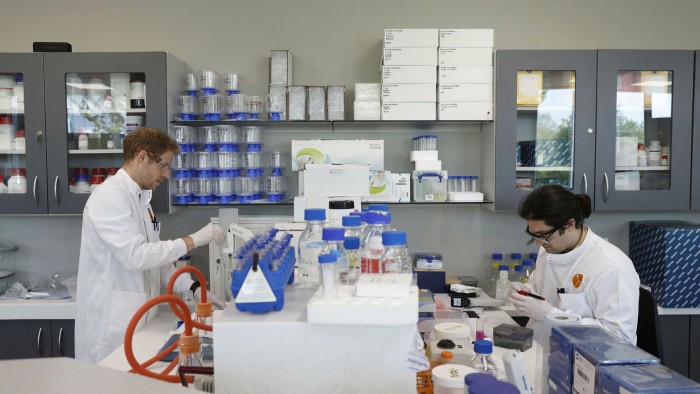Venture capitalists raise more than $100bn to target life sciences

Roula Khalaf, Editor of the FT, selects her favourite stories in this weekly newsletter.
Venture capitalists are raising record amounts of cash to pour into life sciences businesses, to gain exposure to a sector which has been in the spotlight during the coronavirus pandemic.
More money has been built up to target new and established life sciences companies this year to date than in the entirety of 2020, itself a record year for investment. That in turn has sent values of life sciences labs, offices and campuses spiralling.
Globally, $103bn in venture capital has been raised this year to date, according to property agency JLL. That compares to $96bn raised last year and $63bn in 2019.
The funds raised will turbocharge the sector’s growth, said Chris Walters, who heads JLL’s UK life sciences practice. “Venture capital growth equates to company growth, which equates to real estate need,” he said.
The majority of venture capital investment is focused on the US, with around $56bn raised in the year to date. That is more than triple the $16bn raised in China, the second-largest market in the world, according to JLL.
A total of $12.3bn has been raised in Europe, where the UK is by far the largest target for investors.
A summer spree saw venture capital investors raise £1.9bn between June and August alone to invest in UK businesses, pushing total funds raised in the year to date to £4.25bn compared with £2.8bn in 2020.
The UK government has also thrown its weight behind the sector, raising its commitment to research and development spending from £15bn by 2027 to £22bn.
The so-called Golden Triangle between London, Oxford and Cambridge has been a particular magnet for investors. Of the seven £50m-plus funding rounds undertaken by UK-based life sciences businesses this year — including a £425m fundraising by medical technology business CMR Surgical in June — all but one have been in the area.
The weight of investment has in turn pushed up the value of specialist labs and campuses. Oxford university’s Magdalen College is selling a stake in the Oxford Science Park, hoping to receive almost seven times what it paid five years ago.
Tom Mellows, who leads the life science occupier services team at estate agency Savills, said “there’s definitely a scarcity of space”.
“In somewhere like Cambridge, which is probably the most mature market for lab space, land is constrained and the planning system takes a long time. The last few lab spaces built in Cambridge have all leased up before being finished,” he said.
As landlords and investors clamour to develop or buy life sciences property there is a risk some will overpay for sites, he warned. “It’s absolutely going to happen. Many UK landlords are not experienced in this sector.”
With limited lab space available in the triangle and prices rising fast, businesses might look elsewhere, said Walters. Manchester and Birmingham already have established life sciences markets and were likely to grow, he said.
As well as venture capitalists, a number of major institutional investors are entering the sector.
Axa IM Alts, a division of French fund group Axa Investment Managers, announced in July that it would spend almost €2bn on specialist laboratory space and offices in Europe, and private equity houses Blackstone and Brookfield have both recently upped their bets on the sector.
Comments